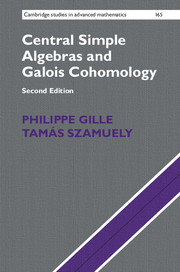Book contents
- Frontmatter
- Contents
- Preface
- 1 Quaternion algebras
- 2 Central simple algebras and Galois descent
- 3 Techniques from group cohomology
- 4 The cohomological Brauer group
- 5 Severi–Brauer varieties
- 6 Residue maps
- 7 Milnor K-theory
- 8 The Merkurjev–Suslin theorem
- 9 Symbols in positive characteristic
- Appendix: a breviary of algebraic geometry
- Bibliography
- Index
2 - Central simple algebras and Galois descent
Published online by Cambridge University Press: 07 August 2017
- Frontmatter
- Contents
- Preface
- 1 Quaternion algebras
- 2 Central simple algebras and Galois descent
- 3 Techniques from group cohomology
- 4 The cohomological Brauer group
- 5 Severi–Brauer varieties
- 6 Residue maps
- 7 Milnor K-theory
- 8 The Merkurjev–Suslin theorem
- 9 Symbols in positive characteristic
- Appendix: a breviary of algebraic geometry
- Bibliography
- Index
Summary
In this chapter we treat the basic theory of central simple algebras from a modern viewpoint. The main point we would like to emphasize is that, as a consequence of Wedderburn's theorem, we may characterize central simple algebras as those finite-dimensional algebras which become isomorphic to some full matrix ring over a finite extension of the base field. We then show that this extension can in fact be chosen to be a Galois extension, which enables us to exploit a powerful theory in our further investigations, that of Galois descent. Using descent we can give elegant treatments of such classical topics as the construction of reduced norms or the Skolem–Noether theorem. The main invariant concerning central simple algebras is the Brauer group, which classifies all finite-dimensional central division algebras over a field. Using Galois descent, we shall identify it with a certain first cohomology set equipped with an abelian group structure.
The foundations of the theory of central simple algebras go back to the great algebraists of the dawn of the twentieth century; we merely mention here the names of Wedderburn, Dickson and Emmy Noether. The Brauer group appears in the pioneering paper of the young Richard Brauer [1]. Though Galois descent had been implicitly used by algebraists in the early years of the twentieth century and Châtelet had considered special cases in connection with Diophantine equations, it was AndréWeil who first gave a systematic treatment with applications to algebraic geometry in mind (Weil [2]). The theory in the form presented below was developed by Jean-Pierre Serre, and finally found a tantalizing generalization in the general descent theory of Grothendieck ([1], [2]).
Wedderburn's theorem
Let k be a field. We assume throughout that all k-algebras under consideration are finite dimensional over k. A k-algebra A is called simple if it has no (two-sided) ideal other than 0 and A. Recall moreover from the previous chapter that A is central if its centre equals k.
Here are the basic examples of central simple algebras.
- Type
- Chapter
- Information
- Central Simple Algebras and Galois Cohomology , pp. 19 - 69Publisher: Cambridge University PressPrint publication year: 2017



